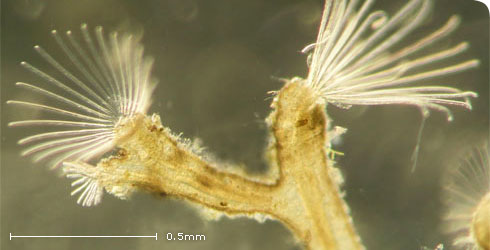Behaviour
Associations
Waterfowl and fish may consume Fredericella sultana directly or with the substratum on which colonies grow (for example, plants) (Fuentes et al. 2004, Applegate 1966).
Dense stands of colonies provide complex three-dimensional habitat for an associated community of protists and microinvertebrates .
Diseases
Fredericella sultana is the most common host of the myxozoan parasite Tetracapsuloides bryosalmonae. Infection reduces statoblast production and growth, but rarely leads to mortality (Tops et al., 2009).
Infective stages of T. bryosalmonae released from Fredericella sultana Proliferative Kidney Disease (PDK), an economically devastating disease of wild and farmed salmonid fish (Anderson et al., 1999; Feist et al., 2001).

Tetracapsuloides bryosalmonae - 22/03/2010
Tetracapsuloides bryosalmonae is a multicellular endoparasite known for causing proliferative kidney disease in trout and salmon, which has resulted in significant economic losses for aquaculture and has threatened wild fish populations. Find out more about Tetracapsuloides bryosalmonae.
